In the competitive landscape of UK web hosting, the availability of robust SSL certificates is crucial for enhancing website security. Providers like Bluehost, SiteGround, and HostGator offer a range of SSL options tailored to various needs, ensuring that sensitive data remains encrypted and secure. Additionally, security ratings for these hosts reflect their effectiveness in safeguarding user data and maintaining website integrity, taking into account factors such as SSL implementation and compliance with data protection regulations.
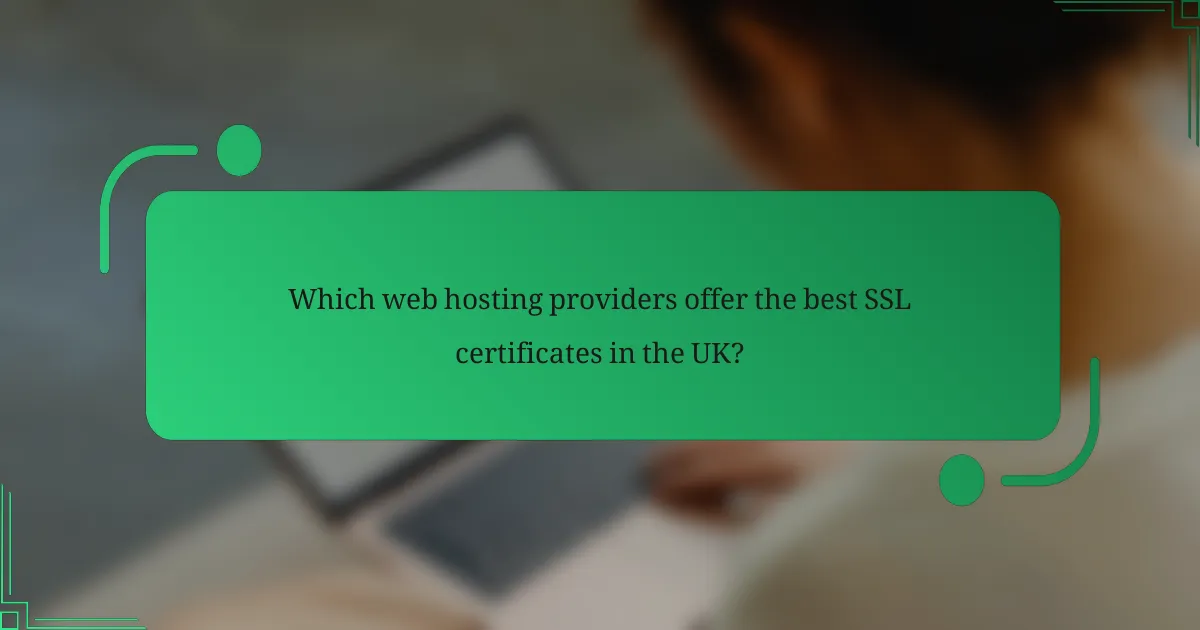
Which web hosting providers offer the best SSL certificates in the UK?
Several web hosting providers in the UK offer robust SSL certificates that enhance website security. Key players like Bluehost, SiteGround, and HostGator provide various SSL options, catering to different needs and budgets.
Bluehost SSL offerings
Bluehost provides a range of SSL certificates, including free basic SSL with all hosting plans. Their offerings include standard SSL for personal websites and more advanced options for e-commerce sites that require higher levels of encryption.
When choosing an SSL certificate with Bluehost, consider the level of security you need. For most small businesses, the free SSL is sufficient, but larger enterprises may benefit from premium certificates that offer additional features like warranty and site seal.
SiteGround SSL features
SiteGround includes free SSL certificates via Let’s Encrypt with all hosting plans, ensuring that even budget-conscious users can secure their sites. They also offer a straightforward installation process, making it easy for users to enable SSL with just a few clicks.
For those needing more advanced security, SiteGround provides premium SSL options that come with additional benefits, such as extended validation and higher warranty amounts. This is particularly useful for online stores and sites handling sensitive data.
HostGator SSL options
HostGator offers free SSL certificates for all shared hosting plans, which is a great advantage for new website owners. Their paid SSL options include standard and wildcard certificates, catering to various website types and sizes.
When selecting an SSL certificate with HostGator, consider your website’s structure. If you manage multiple subdomains, a wildcard SSL may be the best choice, as it secures all subdomains under a single certificate, simplifying management and reducing costs.
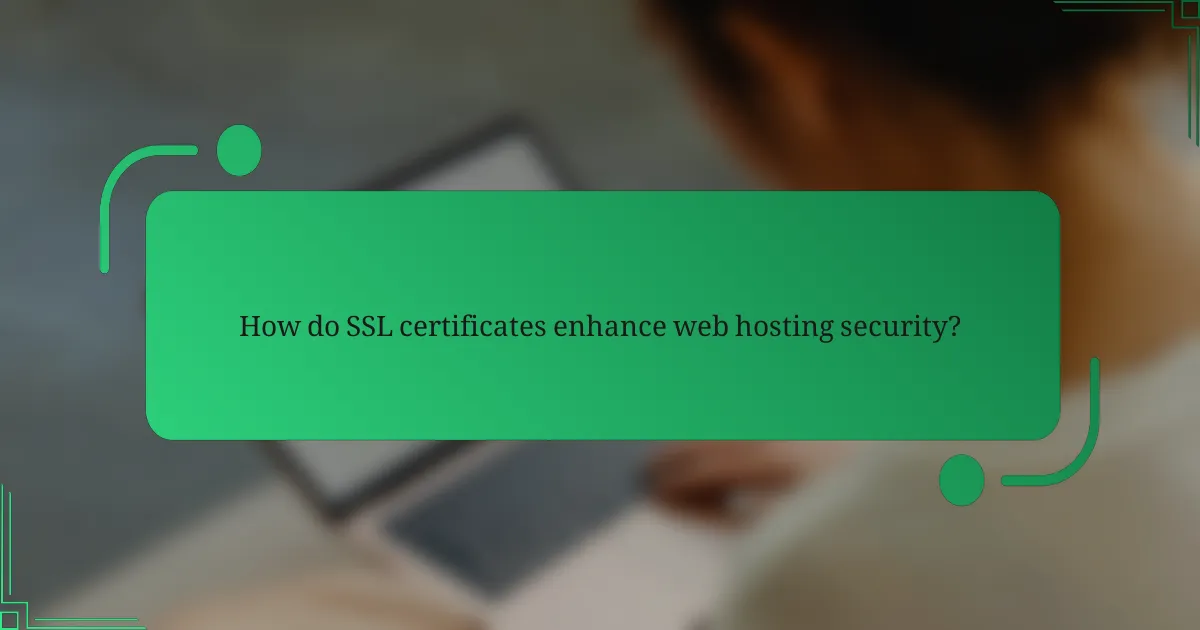
How do SSL certificates enhance web hosting security?
SSL certificates significantly enhance web hosting security by encrypting data transmitted between users and websites, ensuring that sensitive information remains private. They also authenticate the identity of the website, which helps to build trust with users and protect against fraud.
Encryption of data
Encryption of data is a fundamental feature of SSL certificates, which use protocols like TLS to secure information during transmission. When a user connects to a website with an SSL certificate, their data is converted into a coded format that is unreadable to anyone who intercepts it.
This encryption protects sensitive information such as credit card numbers and personal details from cybercriminals. It’s essential for any website that handles financial transactions or collects personal data, as it helps to comply with data protection regulations like GDPR in Europe.
Authentication of identity
Authentication of identity is another critical aspect of SSL certificates, which verify that a website is genuinely owned by the entity it claims to represent. This process involves validating the ownership of the domain and may require additional documentation for higher-level certificates.
Users can easily identify secure websites by looking for the padlock icon in the browser’s address bar. This visual cue reassures visitors that their connection is secure and that they are interacting with a legitimate site, which is vital for maintaining customer trust and preventing phishing attacks.
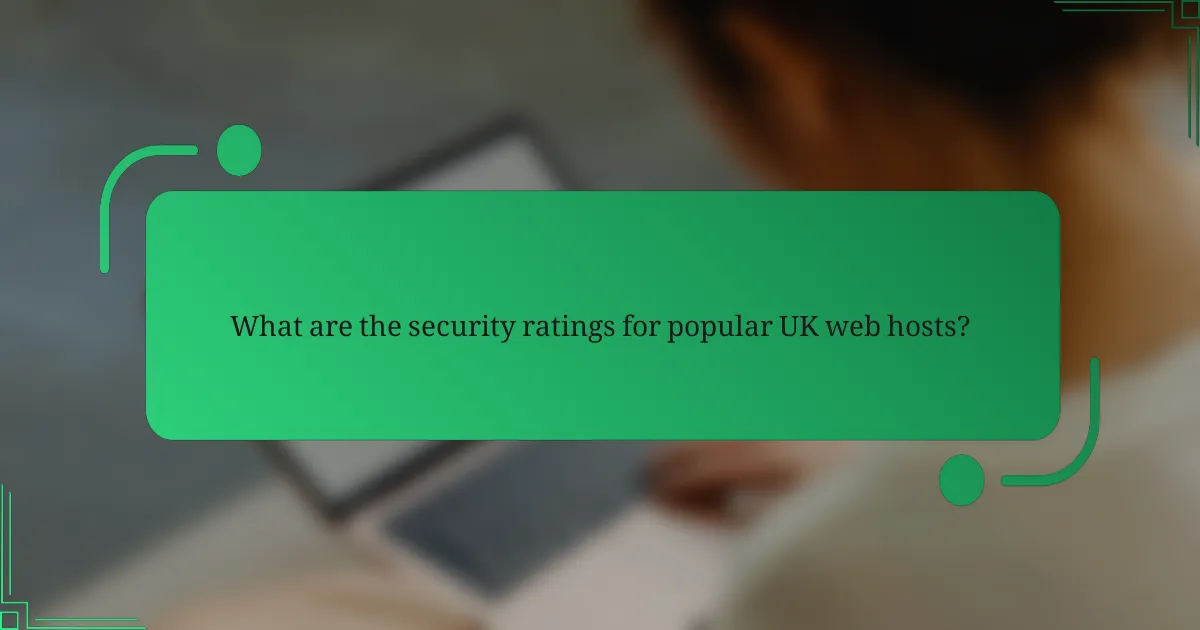
What are the security ratings for popular UK web hosts?
Security ratings for UK web hosts indicate how well they protect user data and maintain website integrity. These ratings often consider factors such as SSL certificate availability, server security measures, and compliance with data protection regulations.
Rating for Bluehost
Bluehost generally receives positive security ratings, particularly for its robust SSL certificate offerings and proactive security measures. The hosting service includes free SSL certificates with all plans, ensuring data encryption for websites.
Additionally, Bluehost employs security features such as SiteLock and CodeGuard, which help in monitoring and backing up websites. Users should consider these features when evaluating Bluehost’s overall security effectiveness.
Rating for SiteGround
SiteGround is highly regarded for its strong security protocols and excellent customer support. It offers free SSL certificates and implements advanced security measures, including AI-driven anti-bot systems to protect against malicious attacks.
SiteGround also provides daily backups and updates to ensure that websites remain secure and up-to-date. This combination of features contributes to its high security ratings, making it a reliable choice for UK users.
Rating for A2 Hosting
A2 Hosting is known for its commitment to security, offering free SSL certificates and a range of additional security features. Their plans include options for proactive security measures like KernelCare, which provides automatic updates to server security without downtime.
Moreover, A2 Hosting’s emphasis on performance, combined with its security offerings, makes it a competitive option for those prioritising website safety. Users should assess their specific needs when considering A2 Hosting’s security capabilities.
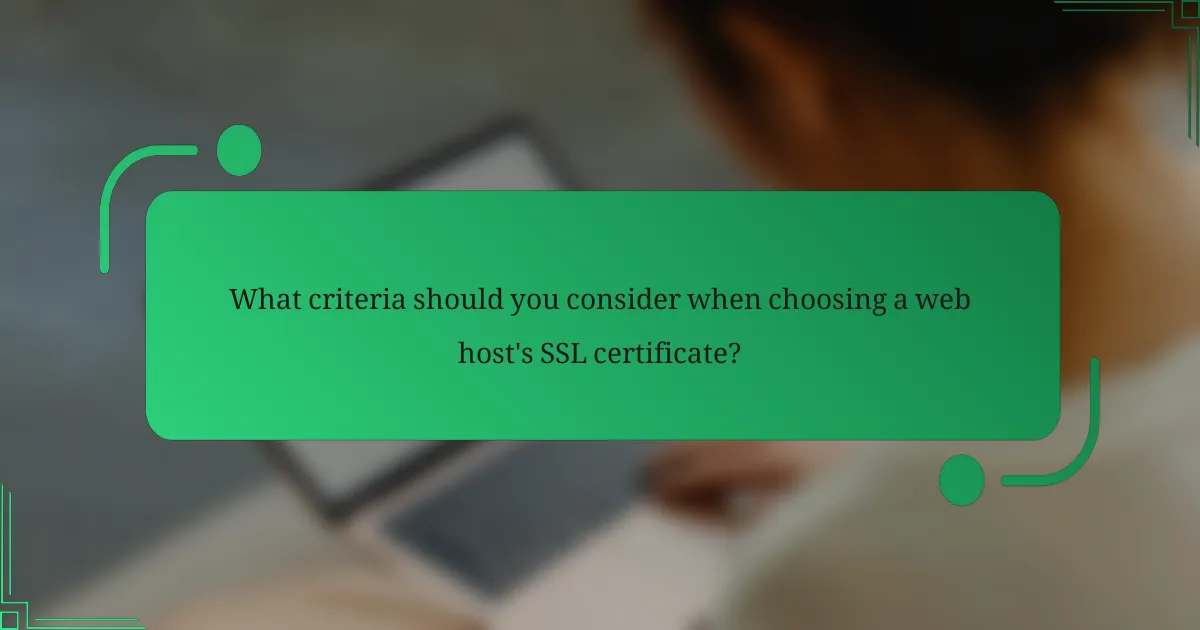
What criteria should you consider when choosing a web host’s SSL certificate?
When selecting a web host’s SSL certificate, consider the type of certificate, its cost, and the level of security it provides. These factors will influence your website’s trustworthiness and protection against data breaches.
Type of SSL certificate
There are several types of SSL certificates, including Domain Validation (DV), Organisation Validation (OV), and Extended Validation (EV). DV certificates are the most basic and quickest to obtain, suitable for personal websites. OV and EV certificates provide higher levels of trust, requiring more verification, making them ideal for businesses handling sensitive information.
Additionally, consider whether a single-domain, multi-domain, or wildcard certificate is needed. A wildcard certificate can secure multiple subdomains, which is cost-effective for businesses with several related sites.
Cost of SSL certificate
The cost of SSL certificates can vary significantly, typically ranging from £10 to £500 per year, depending on the type and level of validation. Basic DV certificates are usually the least expensive, while OV and EV certificates command higher prices due to the additional verification processes involved.
When budgeting for an SSL certificate, factor in potential renewal costs and whether the web host offers free SSL options, such as Let’s Encrypt, which can be a viable choice for smaller websites. Always compare features and prices across different providers to ensure you get the best value for your needs.
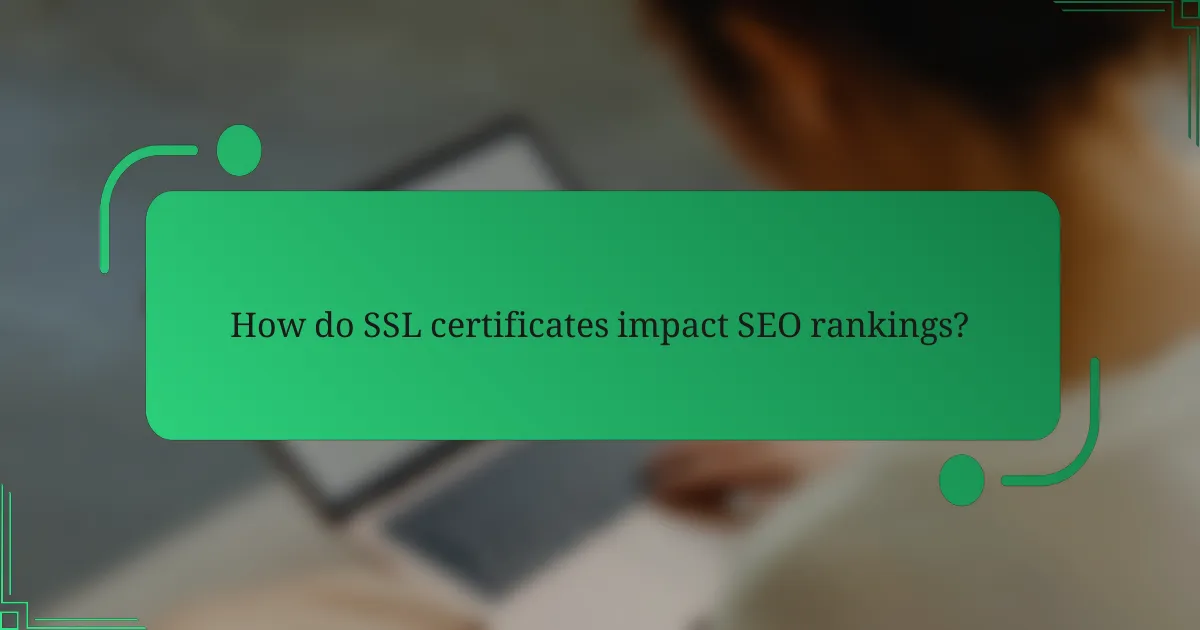
How do SSL certificates impact SEO rankings?
SSL certificates play a significant role in SEO rankings by ensuring secure connections, which search engines favour. Websites with HTTPS are generally ranked higher than those without, as security is a key factor in user trust and experience.
HTTPS as a ranking factor
Search engines like Google consider HTTPS as a positive ranking signal. Websites that use SSL certificates to secure their connections are more likely to appear higher in search results compared to their HTTP counterparts. This means that adopting HTTPS can lead to improved visibility and potentially more traffic.
Moreover, the transition to HTTPS is increasingly becoming a standard practice, with many users expecting secure connections. Not implementing SSL could result in lost opportunities, especially as search engines continue to prioritise secure sites.
Trust signals for users
SSL certificates provide essential trust signals to users, indicating that their data is protected during transmission. When users see the padlock icon in their browser’s address bar, they are more likely to feel secure when interacting with the site, which can lead to higher conversion rates.
In addition, websites lacking SSL may display warnings in browsers, which can deter users from proceeding. This negative perception can harm a site’s reputation and lead to decreased traffic and engagement, making SSL a crucial investment for any online business.
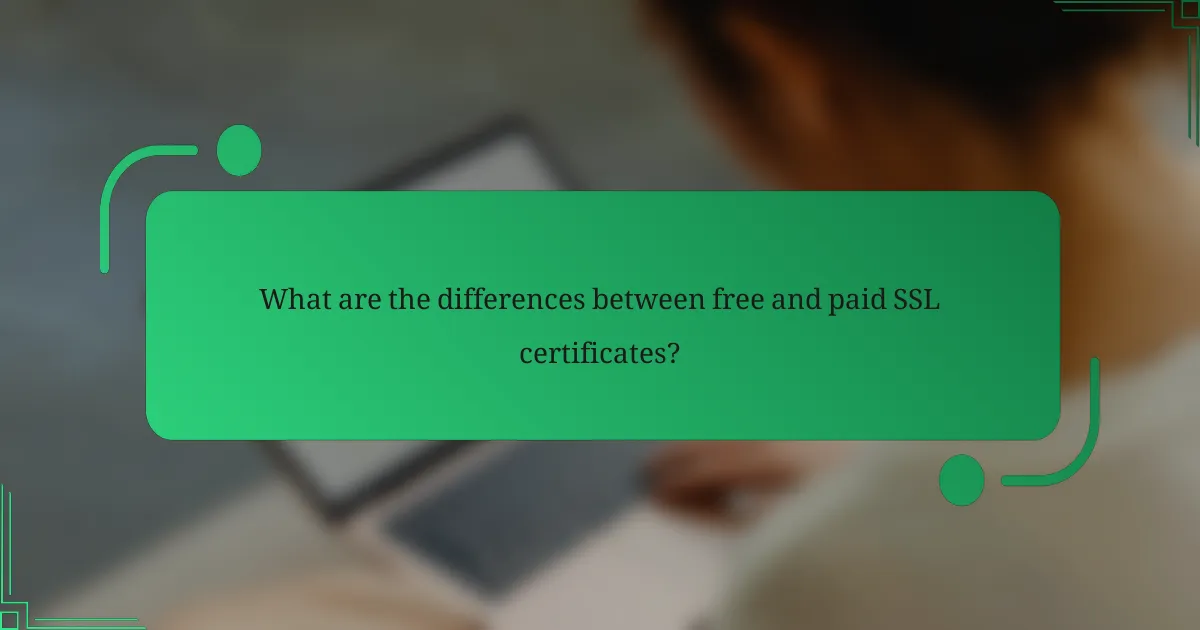
What are the differences between free and paid SSL certificates?
Free SSL certificates offer basic encryption and are suitable for personal websites or small projects, while paid SSL certificates provide enhanced security features, support, and warranties, making them ideal for businesses and e-commerce sites.
Features of free SSL certificates
Free SSL certificates typically provide domain validation, which verifies ownership of the domain but does not confirm the identity of the organisation behind it. They are often issued quickly, sometimes within minutes, and can be obtained from providers like Let’s Encrypt.
However, free certificates usually lack additional features such as customer support, warranty coverage, and advanced encryption options. They may also require renewal every few months, which can be a hassle for some users.
Benefits of paid SSL certificates
Paid SSL certificates come with several advantages, including organisation validation, which verifies the identity of the business, thus enhancing customer trust. They often include warranties that protect users against data breaches, providing peace of mind for e-commerce transactions.
Additionally, paid options typically offer better customer support, ensuring that any issues can be resolved quickly. They may also include features like multi-domain support and extended validation, which can be crucial for larger businesses or those handling sensitive information.